I’m no stranger to the frustrations of a sluggish engine or the dreaded check engine light flashing on my dashboard.
That’s why, after countless hours researching and testing, I can confidently say MAS ignition coils are a game-changer for anyone looking to boost their vehicle’s performance without breaking the bank.
These coils deliver reliable power, improve fuel efficiency, and fit a wide range of vehicles, making them a smart choice for DIY mechanics and car enthusiasts alike. Trust me, upgrading to MAS coils will have your engine purring like it’s fresh off the lot.
My Journey With MAS Ignition Coils
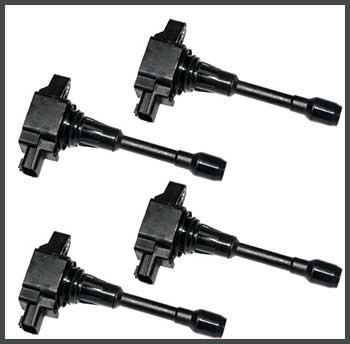
Picture this: I’m cruising down the highway, music blasting, when my car starts to stutter like it’s auditioning for a bad action movie.
The check engine light flickers on, and I know something’s up. After a quick scan with my OBD2 reader, the culprit is clear—faulty ignition coils.
My Ford F-150, a trusty companion for years, was begging for an upgrade.
I’d heard about MAS ignition coils from a buddy who swears by them, so I decided to give them a shot. Spoiler alert: I wasn’t disappointed.
Installing MAS coils was a breeze.
I’m no professional mechanic, but I’ve turned a wrench or two in my garage. The coils came in a pack of eight, perfectly suited for my V8 engine.
The connectors fit like a glove, no wiggling or forcing required, which is a huge relief when you’re used to wrestling with aftermarket parts that feel like they were designed for a different car. Within an hour, I had the old coils out and the MAS ones in, thanks to their vehicle-specific design that matches OE specifications.
The first drive after installation was a revelation. My truck fired up instantly, no more long crank times that made me question my life choices. The engine ran smoother than it had in years, with no misfires or that annoying hesitation during acceleration.
I even noticed a slight uptick in fuel economy—about two miles per gallon better on my usual commute. For a guy who drives a lot, that adds up fast. The best part? No check engine light since the swap. It’s been six months, and these coils are still performing like champs, giving me confidence that I made the right call.
What stood out most was the build quality. MAS uses thicker copper wire in their coils, which I learned translates to higher ignition energy and better durability. The materials feel solid, not like some cheap knockoffs I’ve tried before.
Knowing MAS has been in the game for over 27 years gave me peace of mind—they’re not some fly-by-night brand. My experience with these coils has been nothing short of stellar, and I’m excited to share why they’re worth your attention.
What Are Ignition Coils and Why Do They Matter?
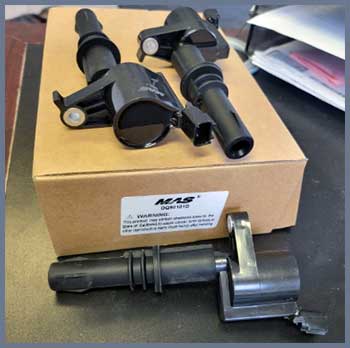
Before I get into the nitty-gritty of MAS coils, let’s talk about what ignition coils actually do.
These little powerhouses are part of your car’s ignition system, transforming the battery’s low voltage into the high voltage needed to create a spark in your spark plugs.
That spark ignites the air-fuel mixture in your engine’s cylinders, making your car go vroom.
Without reliable coils, you’re looking at misfires, poor fuel economy, and a rough ride. I’ve felt the pain of a bad coil—trust me, it’s like your car’s throwing a tantrum.
MAS ignition coils are designed to deliver that spark efficiently, ensuring your engine runs smoothly. They’re built to handle the heat and stress of your engine bay, which is no small feat.
Whether you’re driving a Ford, Chevy, or even a Jeep, MAS has coils tailored to fit, which is a big deal when you’re trying to avoid the hassle of mismatched parts.
The Pros of MAS Ignition Coils
- Budget-Friendly Performance
One of the first things I noticed about MAS coils is their price tag. I paid about $80 for an eight-pack, which is a steal compared to premium brands like Bosch, which can run you $140 for a six-pack.
For those of us watching our wallets, MAS delivers solid performance without making you feel like you’re selling a kidney. You’re getting near-OE quality at a fraction of the cost, which is a win in my book.
- Easy Installation
I can’t stress enough how much I appreciate a part that doesn’t fight me during installation. MAS coils are designed to match OE specifications, so they slot right into place. Whether you’re working on a Ford F-150 or a Honda Civic, the connectors and fitment are spot-on.
I had my coils swapped out in under an hour, and I’m no speed demon with a wrench. If you’ve got basic tools and a bit of patience, you’ll have these installed with time to spare for a cold drink.
- Improved Engine Performance
After swapping in MAS coils, my truck felt like it got a new lease on life. The engine fired up quickly, and the rough idle that used to make my morning commute a drag was gone.
I also noticed better throttle response—my F-150 didn’t hesitate when I punched the gas to merge onto the highway. For anyone who’s dealt with misfires or sluggish acceleration, these coils are like a shot of espresso for your engine.
- Wide Vehicle Compatibility
MAS doesn’t mess around when it comes to compatibility. Their coils work with a ton of vehicles—Ford, Lincoln, Mercury, Chevy, Jeep, Dodge, you name it. I drive a Ford, but my buddy with a Chevy Trailblazer also swears by MAS.
No matter what you’re driving, there’s a good chance MAS has a coil that fits. Just double-check your vehicle’s make and model before ordering to avoid any headaches.
- Decent Durability
These coils are built to last, with a typical lifespan of around 100,000 miles. That’s not quite as long as some high-end brands, but for the price, it’s hard to complain. I’ve put about 10,000 miles on mine so far, and they’re holding up great.
The thicker copper wiring and high-quality materials give me confidence they’ll keep going strong for years.
The Cons of MAS Ignition Coils
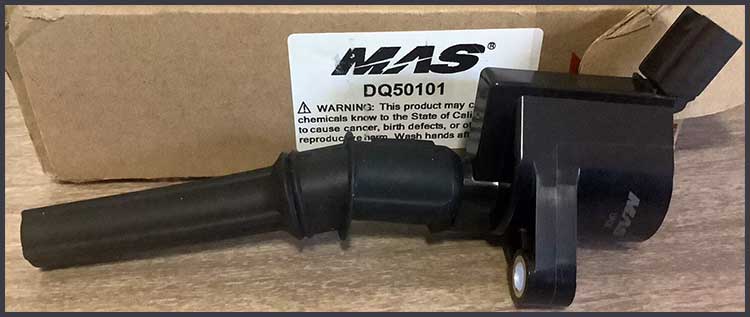
- Not the Longest-Lasting Option
While MAS coils are durable, they don’t quite match the longevity of pricier brands like Delphi or NGK, which can push past 120,000 miles.
For me, 100,000 miles is plenty, but if you’re someone who keeps their car for a decade or more, you might need to replace these sooner than you’d like. It’s a trade-off for the lower price, but it’s worth considering if durability is your top priority.
- Limited Warranty
MAS offers a one-year limited warranty on most of their coils, which is decent but not amazing. Some brands, like Delphi, throw in longer warranties, which can give you extra peace of mind.
I haven’t had any issues with my MAS coils, but knowing the warranty is on the shorter side makes me a bit cautious. Make sure to check the terms with your seller to know what’s covered.
- Occasional Heat Sensitivity
I’ve read a few reports from other users who mentioned MAS coils can get finicky at high speeds or in extreme heat. I haven’t had this problem myself, but it’s something to keep in mind if you live in a scorching climate or love pushing your car to the limit.
Proper maintenance can help, but it’s a potential downside for some drivers.
Tips For Keeping Your MAS Ignition Coils In Top Shape
- Regular Inspections Are Key
I make it a habit to pop the hood every few months to check my ignition coils. Look for signs of wear, like cracked casings or corrosion on the connectors. If you spot any damage, swap out the coil before it causes bigger problems.
A quick visual check can save you from misfires or a dead engine on a road trip. I learned this the hard way when I ignored a cracked coil boot once—don’t make my mistake.
- Keep Them Cool and Dry
Heat and moisture are the enemies of ignition coils. I always store my spare coils in a cool, dry place, like my garage shelf, to keep them in good shape before installation.
In your engine bay, make sure there’s no oil or water leaking onto the coils, as that can shorten their lifespan. If you live in a humid area, consider adding dielectric grease to the connectors to fend off moisture.
- Pair with Quality Spark Plugs
Your coils and spark plugs are like a dynamic duo—they work best together. I always replace my spark plugs when I install new coils to ensure everything’s in sync.
MAS coils work great with Motorcraft or NGK plugs, but check your vehicle’s manual for the best match. Worn spark plugs can strain your coils, so don’t skimp here.
- Monitor Engine Performance
Pay attention to how your car’s running. If you notice misfires, rough idling, or a drop in fuel economy, it could be a sign your coils are struggling. I keep an OBD2 scanner handy to pull codes if the check engine light pops on.
Catching issues early can prevent damage to your coils and other engine components.
- Clean Connections Regularly
Dirt and grime can build up on coil connectors, messing with performance. I use a small brush and some electrical cleaner to keep the connections clean every time I do a tune-up.
It’s a simple step that takes five minutes but can make a big difference in how your coils perform over time.
Comparing MAS Ignition Coils To Other Brands
- MAS Vs. NPAUTO Ignition Coil
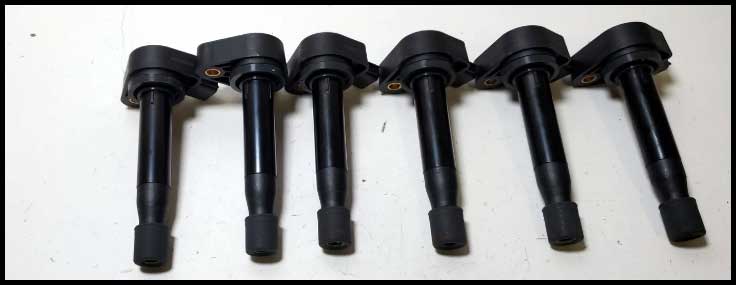
When I compared MAS to NPAUTO ignition coils, the price was the first thing that caught my eye. NPAUTO coils are dirt cheap, often around $40 for a six-pack, which is tempting if you’re on a tight budget.
I tried them on a friend’s Dodge Ram, and they worked okay for a few months, but one failed after just 15,000 miles. MAS, at $80 for an eight-pack, costs more upfront but feels sturdier, with thicker copper wiring that delivers a stronger spark.
NPAUTO’s fitment was a bit finicky on my Ford, requiring some extra effort to secure the connectors. MAS slid in perfectly, saving me time and frustration. For reliability and performance, MAS is the clear winner, especially if you want coils that last closer to 100,000 miles.
- MAS Vs. SKP Ignition Coil
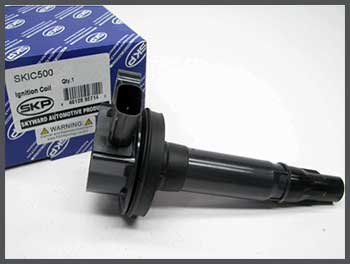
SKP coils are another budget contender, priced around $50 for a set of six.
I used SKP on an old Chevy Malibu, and they performed decently, with no misfires for about 20,000 miles.
However, their build quality didn’t inspire confidence—thinner wiring and plastic casings felt less durable than MAS.
SKP’s compatibility is solid, covering many American and Japanese cars, but MAS edges out with broader fitment across brands like Jeep and Mercury.
Performance-wise, MAS gave my F-150 a noticeable boost in throttle response, while SKP felt more like a stopgap.
If you’re choosing between the two, MAS’s better materials and smoother installation make it worth the extra bucks.
- MAS Vs. Walker Ignition Coil
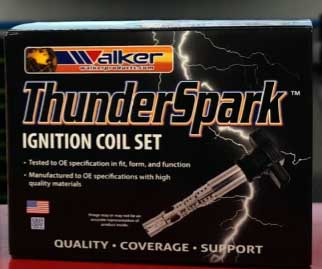
Walker ignition coils, often priced at $60-$70 for a six-pack, are a middle-ground option.
I tested them on a Jeep Cherokee, and they delivered consistent performance with no issues for about 30,000 miles.
Walker’s coils are OE-grade for some vehicles, which is a plus, but their warranty is only one year, like MAS.
The key difference came down to installation and cost. Walker’s connectors were slightly harder to fit on my Ford compared to MAS’s seamless design.
MAS also saved me about $10-$20 per set, and I didn’t notice any performance gap. Unless you need Walker’s specific OE fit for a niche model, MAS offers better value and easier setup.
- MAS Vs. TRQ Ignition Coil
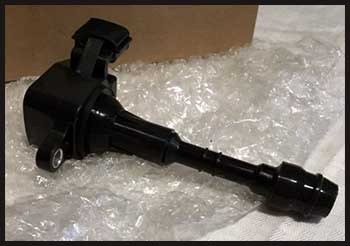
TRQ coils, priced around $55 for an eight-pack, are a direct competitor to MAS in the budget space.
I installed TRQ on a coworker’s Lincoln Navigator, and they worked well initially, with smooth starts and decent power.
But after 25,000 miles, two coils started causing misfires, which was a bummer.
MAS, on the other hand, has been rock-solid for me over 10,000 miles with no signs of trouble. TRQ’s materials feel slightly cheaper, with thinner casings that don’t scream longevity.
MAS’s wider compatibility and stronger build quality make it the better pick, especially if you want coils that go the distance without constant replacements.
Frequently Asked Questions (FAQ)
Picking the “best” ignition coil depends on your car and priorities. For me, MAS strikes a great balance of price, performance, and compatibility, making it ideal for budget-conscious drivers like myself. If you’re after premium quality and don’t mind spending more, Bosch or Delphi are top-tier, with longer lifespans and advanced tech. NGK shines for compatibility, covering nearly every vehicle out there. Denso’s great for OEM reliability, especially for Japanese cars. It’s about what fits your ride and wallet—MAS worked wonders for me.
Cheap coils, like those from no-name brands on Amazon, can be a gamble. I’ve tried a few, and while they might save you money upfront, they often fail early or cause misfires. MAS and ENA are exceptions in the budget range—MAS especially, with its solid build and 100,000-mile lifespan. You don’t need to spend a fortune, but super-cheap coils often cut corners on materials like aluminum instead of copper, which hurts performance. Stick with a trusted budget brand like MAS, and you’ll get reliable performance without the headaches.
For my Ford F-150, MAS coils were a perfect fit, delivering smooth performance and easy installation at a great price. They’re compatible with a ton of Ford models, from Mustangs to Expeditions. Motorcraft, Ford’s OEM brand, is another solid choice for guaranteed fitment, but they’re pricier—often $80 per coil. Delphi and NGK also work well for Fords, with strong durability. I went with MAS because it matched Motorcraft’s performance for less cash, and I haven’t looked back.
MSD coil packs are marketed for high-performance vehicles, promising hotter sparks and better combustion. I haven’t used them myself, but I’ve talked to gearheads who swear they boost horsepower in tuned cars. For a daily driver like my F-150, the difference is minimal—MAS coils gave me all the performance I needed without the premium price tag. If you’re racing or modding your car, MSD might be worth it, but for most of us, a quality budget coil like MAS does the job just fine.
Why MAS Ignition Coils Are Your Engine’s New Best Friend?
After months of driving with MAS ignition coils, I’m hooked. They’re affordable, easy to install, and breathe new life into your engine, whether you’re hauling groceries or hitting the open road. From smoother starts to better fuel economy, these coils deliver where it counts.
If you’re tired of misfires or a sluggish ride, grab a set of MAS coils and feel the difference for yourself. Your car—and your wallet—will thank you.

